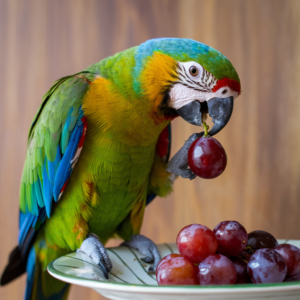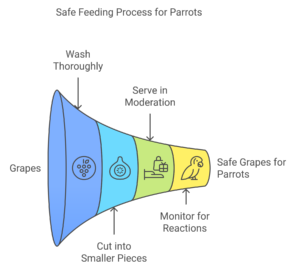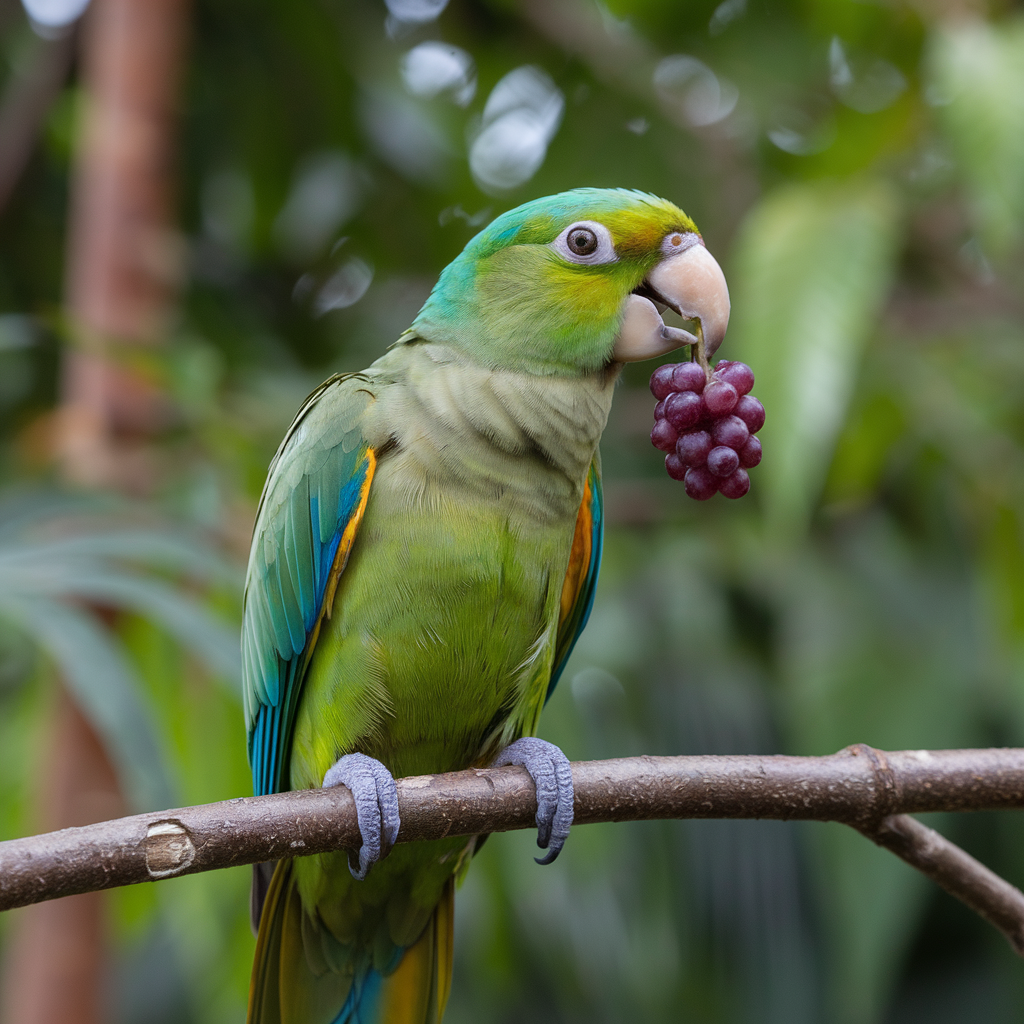Parrots are captivating creatures known for their intelligence, vibrant personalities, and unique dietary needs. As responsible pet owners, we must ensure our food meets their nutritional and safety requirements. One common question parrot owners often ask is: Can parrots have grapes? This comprehensive guide will investigate whether grapes are safe for parrots, their nutritional value, health benefits, and potential risks. We’ll also explore best practices for feeding grapes to parrots and alternative fruits to keep your feathered friend healthy and happy.
Key Takeaways
- Grapes are safe for parrots when fed in moderation and can provide several health benefits.
- Grapes’ nutritional content includes vitamins C and K, fiber, and antioxidants, which can aid digestion, boost immunity, and enhance feather health.
- Overfeeding grapes can lead to health issues like obesity and digestive problems due to their high sugar content.
- Always wash grapes thoroughly and consider using seedless varieties to prevent choking hazards.
- Variety is essential: Incorporate a range of fruits into your parrot’s diet to ensure balanced nutrition.
Are Grapes Safe for Parrots?
Grapes are generally safe for parrots when fed in moderation. They contain no toxic substances that would harm your bird, making them a suitable occasional treat. However, moderation is vital because grapes offer hydration and energy due to their high water and sugar content, so they shouldn’t become a staple in your parrot’s diet.

Why Grapes Are Safe
No toxic compounds are present in grapes, making them a safe fruit for your parrot. Unlike foods such as avocados or chocolate, which harm birds, grapes can be eaten without causing immediate health problems. However, you should always ensure the grapes are clean, pesticide-free, and served in manageable portions to avoid potential issues.
List of Toxic Foods for Parrots:
- Avocados
- Chocolate
- Onions
- Garlic
- Caffeine
Nutritional Value of Grapes for Parrots
Grapes offer more than just a sweet snack—they pack various nutrients that can benefit your parrot’s health. Here’s a breakdown of the essential vitamins and minerals found in grapes:
| Nutrient | Per 100g of Grapes | Benefit to Parrots |
|---|---|---|
| Vitamin C | 4.6 mg | Boosts immune system and feather health |
| Vitamin K | 14.6 µg | Aids in blood clotting and bone health |
| Antioxidants | High | Protects cells from oxidative stress |
| Fiber | 1.5 g | Aids digestion and prevents constipation |
| Potassium | 191 mg | Supports heart and muscle function |
Why These Nutrients Matter
The antioxidants in grapes, particularly resveratrol, can support your parrot’s immune system and help combat free radicals, potentially extending their lifespan. Fiber ensures better digestion, preventing constipation, while Vitamin K helps maintain strong bones, especially for aging parrots.
Despite these benefits, the high sugar content (around 15.5g of sugar per 100g of grapes) is a significant consideration. Parrots do not require a high-sugar diet, and too much sugar can lead to obesity, liver issues, and other health complications.
Health Benefits of Feeding Grapes to Parrots
Feeding grapes in controlled amounts can provide several health benefits to your parrot. These include:
- Improved Digestion: Grapes’ fiber aids digestion and can prevent constipation, especially in birds that might consume a more grain-heavy diet.
- Boosts Immune System: The Vitamin C content in grapes can enhance your parrot’s immune defenses, especially during stress or illness.
- Better Feather Health: Vitamin K and antioxidants contribute to shiny, strong feathers by ensuring proper circulation and protecting the skin from oxidative stress.
- Hydration: Grapes have high water content, making them an excellent option for keeping your bird hydrated, particularly in hot climates.
Despite these benefits, grapes should not be overfed due to their sugar content. Use them as occasional treats, not daily snacks.
Risks and Considerations: When Not to Feed Grapes
While grapes are generally safe, there are some risks associated with overfeeding. The primary concern is the high sugar content, which can lead to obesity, diabetes, and liver problems if fed in excess. In the wild, parrots typically consume grains, seeds, and occasional fruits, but these fruits are often less sweet than cultivated varieties.
Possible Issues from Overfeeding Grapes:
- Weight gain due to high sugar intake.
- Digestive issues like diarrhea from too much fiber or sugar.
- Pesticide residues if grapes aren’t thoroughly washed.
Washing and Preparing Grapes
Always wash grapes thoroughly before feeding them to your parrot to avoid harmful chemicals from pesticides. Organic grapes are a better option, as they are free from synthetic pesticides that can harm your bird. If you can’t find organic grapes, soaking them in a vinegar-water solution for 15 minutes can help reduce pesticide residues.
How to Safely Feed Grapes to Parrots
Following best practices is essential to ensure their safety when feeding grapes to your parrot. Here are some tips:
- Wash thoroughly: Always wash grapes under cold running water to remove dirt and pesticide residue.
- Cut into smaller pieces: If your parrot is small, cutting the grapes into halves or quarters is an excellent idea to prevent choking.
- Serve in moderation: Offer grapes as a treat, not a regular part of their diet. One or two grapes, cut into pieces, is usually enough.
- Monitor for reactions: After introducing grapes, observe your parrot for any signs of digestive discomfort or unusual behavior.

Other Fruits That Are Safe for Parrots
In addition to grapes, many other fruits are safe and beneficial for parrots. Variety is essential for parrots to get a range of nutrients. Here’s a list of different fruits you can include in your parrot’s diet:
- Apples (without seeds)
- Bananas
- Blueberries
- Papaya
- Mango
- Pineapple
Comparing Grapes with Other Fruits
Grapes are higher in sugar than other fruits, and grapes are given sparingly. Apples and bananas offer less sugar and more fiber, making them good alternate alternative seats.
| Fruit | Sugar Content (per 100g) | Fiber (per 100g) |
|---|---|---|
| Grapes | 15.5g | 1.5g |
| Apples | 10g | 2.4g |
| Bananas | 12g | 2.6g |
Can Parrots Eat Grapes with Seeds?
Many types of grapes come with seeds, and parrot owners may wonder if these seeds are safe for their pets. While grape seeds aren’t toxic, they can pose a choking hazard, especially for smaller birds. Sticking with seedless grapes or removing the seeds before serving is best. Large parrots, like Macaws, may be able to handle seeds without issue, but it’s always safer to err on the side of caution.
Do Different Types of Parrots React Differently to Grapes?
Parrot species can vary in their tolerance to sugar and other dietary components. For example:
- African Greys may benefit from grapes’ immune-boosting properties due to their sensitivity to stress.
- Cockatoos tend to gain weight quickly, so their intake of sugary foods like grapes should be limited.
- Budgerigars (Budgies) have smaller digestive systems, meaning even a small amount of grapes can impact their overall diet balance.
It’s essential to consider the size and species of your parrot when offering sugary fruits like grapes.
Frequently Asked Questions (FAQs)
Can Baby Parrots Eat Grapes?
Yes, but in smaller portions. Ensure the grapes are seedless and cut into tiny, manageable pieces to avoid choking.
How Many Grapes Should I Give My Parrot?
One or two grapes, cut into smaller pieces, are typically enough for most parrot species. Always feed in moderation.
Are Organic Grapes Better for Parrots?
Yes, organic grapes are free from synthetic pesticides, making them a safer option for your bird.
What Should I Do If My Parrot Eats Too Many Grapes?
If your parrot consumes too many grapes, watch for signs of digestive distress such as diarrhea. Reduce fruit intake for a few days and ensure they have access to plenty of water.
Can Grapes Be Mixed with Other Foods for Parrots?
Absolutely! Mixing small pieces of grapes with other fruits or vegetables can add variety and excitement to your parrot’s diet.
Conclusion: Moderation and Variety Are Key
So, can parrots have grapes? Yes, they can—but in moderation. Grapes offer nutritional benefits like vitamins, antioxidants, and hydration, but their high sugar content should be treated as an occasional snack rather than a daily part of your parrot’s diet. Always ensure you provide a balanced variety of fruits and vegetables to keep your parrot healthy and happy. Remember, when it comes to feeding parrots, moderation and variety are the best practices for a long, healthy life.
Read also: are birds affected by deer out spray?

